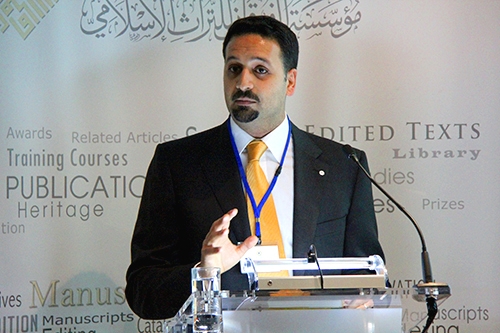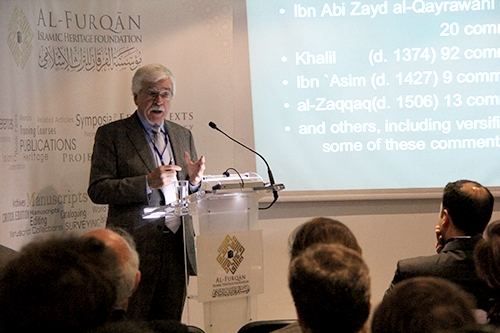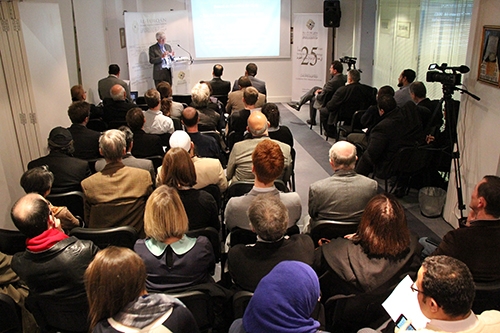On Wednesday 6th March 2013, Al-Furqān Islamic Heritage Foundation organised a public lecture titled “The Manuscripts of Timbuktu and Islamic Writing in West Africa: from the veneration of objects to the object of their veneration”, delivered by Charles Stewart, Professor Emeritus of History at the University of Illinois at Urbana-Champaign and a Visiting Scholar at Northwestern University’s Institute for the Study of Islamic Thought in Africa.
After the reception and the opening words, Mr. Sharaf Yamani, member of the Al-Furqān Board of Directors, gave a short brief on “The African Manuscripts and Al-Furqān’s Work in This Field”. He highlighted the fact that Al-Furqān has so far published 16 catalogues in 33 volumes, recording approximately 30,215 Islamic manuscripts in Africa. Also, the Foundation has organised 3 training courses on cataloguing and 3 training courses on editing, aimed at young scholars, university graduates and librarians from different African countries who have not been specifically trained in handling and editing manuscripts.

The keynote speaker at this public event was Professor Charles Stewart, professor emeritus of history at the University of Illinois at Urbana-Champaign and a visiting scholar at Northwestern University’s Institute for the Study of Islamic Thought in Africa. His lecture on “The Manuscripts of Timbuktu and Islamic Writing in West Africa; from the veneration of objects to the object of their veneration” was very well received. He gave an insightful view on the long tradition of Islamic learning and writing in West Africa that is subsumed (and sometimes lost) in the fabled name of the northern Malian city, Timbuktu, as well as the much larger manuscript repositories of this literary tradition in Mauritania, and the equally-important collections in Niger and Nigeria. According to him, these many manuscript collections, separated by multiple national borders, represent a single Islamic scholarly heritage (that is, in part, linked to Timbuktu). By examining the most commonly-found teaching texts found in manuscript collections across West Africa, he concluded that there is a ‹core curriculum› and a homogeneous Islamic scholarship across that region, based, on a common set of classical authorities used during the last 300 years. The outlines of an autonomous West African body of scholarship emerged in the 19th century. What was taught there and commented upon varied little from contemporary teaching in Fes or Cairo. The “Timbuktu manuscripts” valuable as they are as artifacts of pre-19th century scholarship, are not nearly as significant as is the peripheral information they contain or that accompanies them, collateral to the scholarly texts, that tell us about the special interests of their writers, their legal reasoning, and their literary compositions.

At the end of his lecture, Professor Stewart gave some information on how and in what way our efforts to preserve the legacy of that literary tradition can best be accomplished:
-First, there remain a large number of small, private libraries, scattered across the Sahel, that ought to be inventoried.
-Second, collections need to be digitised to preserve them from unforeseen dangers, and the digitised collections need to be made ‘open-access’ and easily accessible online.
-Third, a union catalogue of manuscripts with electronic links to digital copies would be an important step.
-Finally, this West African manuscript culture needs to be tied into other, North African and Middle Eastern manuscript data bases. Only by doing this will the unique be distinguishable from the ordinary, and the original be appreciated for the genius it represents.
According to Professor Stewart, this is the formula for moving from venerating these manuscripts as objects, to understanding the reasons for, or the object of their veneration.

* Charles Stewart is Professor Emeritus of History at the University of Illinois at Urbana-Champaign and a Visiting Scholar at Northwestern University›s Institute for the Study of Islamic Thought in Africa. Professor Stewart has written widely on Islam in West Africa in the 18th through 20th centuries. He is the author of Islam and Social Order in Mauritania: A Case Study from the Nineteenth Century and the founder of the Arabic Manuscript Management System, a bilingual database of over 20,000 Arabic manuscripts from West Africa.

